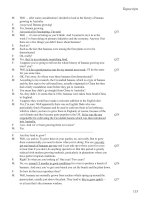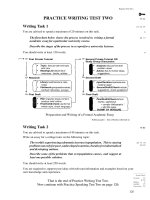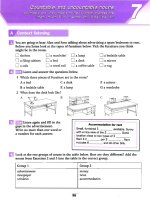Hinds for Ielts 9 ppsx
Bạn đang xem bản rút gọn của tài liệu. Xem và tải ngay bản đầy đủ của tài liệu tại đây (45.16 KB, 6 trang )
101 Helpful Hints for IELTS
for an increasing number to attend classes to improve their English for alternative reasons.
Paragraph (v)
Australia and New Zealand have roughly the same mix of students in their language classrooms,
but not all students of English who choose these countries are from Asia. The emerging global
consciousness of the late twentieth century has meant that students from as far as Sweden and
Brazil are choosing to combine a taste for exotic travel with the study of English 'down under'
and in 'the land of the long white cloud'. But even the Asian economic downturn in the 1990s
has not significantly altered the demographic composition of the majority of English language
classrooms within the region.
Paragraph (vi)
Nor have the economic problems in Asia caused appreciable drops in full-time college and
university attendances by Asian students in these two countries. This is partly because there has
always been a greater demand for enrolment at Australian and New Zealand tertiary institutions
than places available to overseas students. In addition, the economic squeeze seems to have had
a compensatory effect. It has clearly caused a reduction in the number of students from affected
countries who are financially able to study overseas. However, there has been a slight but
noticeable shift towards Australia and New Zealand by less wealthy Asian students who might
otherwise have chosen the United States for English study.
Paragraph (vii)
The U.S. and Britain will always be the first choice of most students wishing to study the English
language abroad, and it is too early to tell whether this trend will continue. However, economic
considerations undoubtedly wield great influence upon Asian and non-Asian students alike. If
student expectations can be met in less traditional study destinations, and as the world continues
to shrink, future international students of English will be advantaged because the choice of viable
study destinations will be wider.
6
8
58
9
Check:
11-15
Questions 1-4
You are advised to spend about 5 minutes on Questions 1-4.
Complete the missing information in the table below by referring to Reading Passage 1
"Destinations for International English Students". Write your answers in boxes 1 - 4 on your
Answer Sheet. The first one has been done for you as an example.
order of popularity
type of English in course
books used in this country
student heterogeneity
(1 = most heterogenous
5 = least heterogenous)
U.S.
1st
American
1
Britain
(Ex:).
(1)
2
Australia
3rd
(2)
(3)
New Zealand
4th
not given
equal 3
Canada
5th
not given
5
94
Practice Test One
Questions 4-9
You are advised to spend about 5 minutes on Questions 4-9.
Choose the most suitable heading from the list of headings below for the seven paragraphs of
Reading Passage 1 "Destinations for International English Students". Write your answers in
boxes 5 - 10 on your Answer Sheet.
6
8
45-46
A.
B.
C.
D.
Example: E.
F.
G.
List of Headings
Heterogeneity in the language classroom
Enrolment demand in Australia & New Zealand.
Reasons for the choice of destination
The attractions of studying in the antipodes
Conclusion
Additional student sources
Student destinations
Q4. Paragraph (i)
Q5. Paragraph (ii)
Q6. Paragraph (iii)
Q7. Paragraph (iv)
Q8.
Q9.
Example:
Paragraph (v)
Paragraph (vi)
Paragraph (vii)
42
11-
/ 45
9
Check:
13-15
Questions 10-15
You are advised to spend about 10 minutes on questions 10 -15.
Refer to Reading Passage 1 "Destinations for International English Students", and look at the
statements below. Write your answers in boxes 10 -15 on your Answer Sheet.
Write T if the statement is True
F if the statement is False
N if the information is Not Given in the text
6
8
34-36
9
Example: There are presently more than 1,000,000 foreign students of English
abroad.
F N
95
101 Helpful Hints for IELTS
11 Q10. Study destination choices are mostly influenced by proximity to home.
T F N
11 Q11. Students who wish to study business will probably study English overseas.
T F N
46 Q12. Students of the same nationality usually make similar study choices.
T F N
35 • 43 Q13. English language classrooms in the U.S. have the widest range of student
nationalities.
T F N
11-48 Q14. Standards at Australian and New Zealand tertiary institutions are improving.
T F N
44-46 Q15. Despite the 1990s Asian economic crisis, Asian students still dominate
the English language classrooms of Australia and New Zealand.
T F N
Check:
11-13-15
96
Practice Test One
Reading Passage 2
Questions 16-31
You are advised to spend about 20 minutes on Questions 16-31.
REGIONAL STUDENT SURVEY
A survey recently commissioned by the English Language Intensive Courses for Overseas Students
(ELICOS) Association has produced valuable data as to why overseas students choose to study in
Australia. Students were asked a range of questions to determine why they had chosen Australia, how
they were going to use the English they had learnt, how they had spent their holidays, and what were their
future plans. There were also asked to compare Australia with other countries where they could study English.
Figure 1. Regional Breakdown of Student Of the 2200 questionnaires handed out, 1684 valid returns
Sample
Other 7%
Pacific 0 5%
Europe 102%
Asia 73 4%
0 20
40 60 80
were used, representing approximately 11% of the
estimated number of students studying at ELICOS
colleges. The regional breakdown of the student sample
was as follows: Asia 73.4%, Europe 10.2%, Pacific
0.5%, Other 7.0%.
Japanese students formed the largest nationality group,
representing 34% of the returns. Other nationality groups
represented in the survey, in descending order, were
Taiwan, Korea, Indonesia, Switzerland, Hong Kong,
Thailand, other European countries, China, and Iran.
The top 11 reasons for choosing Australia as a place to study English were, in order of ranking, as follows:
1. Safety
2. Friends and relations in Australia
3. Climate and friendliness of Australians
4. Combine study with travel
5. Low cost of living
6. Friend's recommendation
7. Close to home country
8. High quality of courses
9. Work while studying
10. Hope to migrate
11. Low tuition fees
Differences emerge when the responses of different nationality groups are analysed, yet there is some
degree of uniformity across regional areas. Students from most Asian countries, for instance, cited
safety, climate, low cost of living, and friendliness of people as reasons for choosing Australia as a place
to learn English. To Indonesian students, however, proximity to home country and quality of courses
were the attractive factors. The overall profile of responses from Japanese students was in line with those
of students from other Asian countries, although the opportunity to combine work and travel, study and
travel, and high standard of courses were the major attractions. Students and tourists from Switzerland
and other European countries were clearly attracted by Australia as a tourist destination. Their reasons
for coming to Australia were quite distinct from those of Asian respondents, but bore some resemblance
to Japanese respondents.
When asked how they planned to use the English they were learning, 41 % answered that they would use
their English for further study in Australia, 37% stated their English was to help obtain employment or
to advance their existing career, 9% planned to use it in their travels, 6% for further study in their home
country, 5% for further study in a third country, and 2% specified "other".
A significantly high proportion of students of all nationalities was interested in English providing a
springboard for further study in Australia. No Swiss student indicated an interest in studying English
as a means of facilitating communication when travelling. Female respondents from Hong Kong, Korea,
6
38-44
52-54-57
97
101 Helpful Hints for IELTS
Taiwan, and Thailand were more concerned than their male counterparts with English as a means to
improve employment or career prospects. Female respondents from Japan and Taiwan were more
interested than their male counterparts in studying English to facilitate travel and to meet people.
Figure 2. Student Objectives for English Study
50 -,
Areas of Consideration
Further Study
in Australia
Employment / Career
Travel - destination
unspecified
Further Study -
Home Country
Further Study - Third
Country
Other
With regard to immediate post-ELICOS study
plans, 41% stated that they would progress
to further studies, close to a third stated they
would return to their home country or move
to a third country, 21% stated they would
travel, and 8% stated they planned to work
temporarily in Australia.
When considering public English language
examinations, 65% of respondents indicated
they would sit for an English test post-study.
More than half indicated their intention to take
IELTS, just over a third named TOEFL, 15% named the Cambridge First Certificate, and 9% stated "other".
There were marked differences in response between students from different countries and across gender.
Asked whether they had had visits from overseas friends or family during their course, 27% of students
responded affirmatively. Students in Queensland were more likely than average to have had visits,
whereas respondents from Western Australia were less likely than the average to have had visits.
The most popular break activity was travelling in Australia - 90% - followed by travelling to home
country - 19% - and, finally, working full or part-time - 9%. While the principal areas of employment
remained in restaurants, cleaning, and factories, there was a steep increase in the number of students
working as shop assistants and tour guides, neither of which were previously significant employment areas.
Respondents were also asked to rank the three top
supplier countries in terms of cost, quality, and visa
ease. In terms of "cost", Britain was regarded as the
most expensive, the U S. second, Canada third, and
Australia fourth. In terms of "quality", first preferences
only, 61% of respondents regarded the U.K. as having
the best quality tuition. Opinion on the supplier of the
second best level of tuition was more evenly divided,
with 34% naming the U.S., and 29% naming Australia.
Australia was considered the third best supplier, with
a 35% response, and 25% naming Canada.
Figure 3. Post - ELICOS Plans
8%
21%
41%
Further Studies
Leave Australia
Travel
Work in Australia
30%
More students believed visas were easier to get for Australia than for any of the other English language
provider countries. Opinion was divided, however, and the view was not held by a clear majority - 35%
of respondents placed Australia first, while 32% placed the U.S. first.
8
26-27
43-57
Questions 16-25
You are advised to spend about 5 minutes on Questions 16-25.
Refer to Reading Passage 2 "Regional Student Survey", and answer the following questions with
suitable numbers, words or phrases. Write your answers in boxes 16 - 25 on your
Answer Sheet. The first one has been done for you as an example.
Example: What is the name of the Association which commissioned the survey?
98
Practice Test One
Q16. Which regional group had the largest percentage of students in the survey? 47-57-59
Q17. Swiss students' reasons for choosing Australia were similar to those of which
Asian nationality group?
47-59
Q18. For what purpose did most students intend to use their English learning? 42-44 47
54
Questions 19 to 21
You are advised to spend about 5 minutes on Questions 19-21.
Complete the following chart with information from the reading passage:
Answer
8-57
9
15-52
15-52
7-15-52
Questions 22 to 25
You are advised to spend about 5 minutes on Questions 22-25.
The notes below were made from information in Reading Passage 2. Complete each gap by
choosing the best word or phrase from the box on the next page. Note that there are more
choices in the box than gaps. You will not need to use all the choices given.
Sixty-five percent of students surveyed said they would sit for an English
test after their study. Over a third intended to take TOEFL, but more than half
indicated their intention to take (Ex:) Jji.lJT.S The two criteria which
determined the responses given when students were asked about English language
tests were gender and (22)
The three most popular activities during course breaks were a) travelling in
Australia, b) (23) and c) working full or part-time. In terms of perceived
(24) , the three top countries, in order of preference, were considered to be
the U.K., the U.S., and Australia. A small majority of students believed (25)
to Australia were the easiest to obtain.
8
43-47
55-56
9
7-12-44
99
Example' The percentage of ELICOS college students represented in the sample:
Q19. The number of specific areas of questioning in the survey:
Q20. The number of reasons given for studying in Australia which are
directly concerned with study issues:
Q21. The percentage of respondents who planned to seek short-term
employment in Australia after completing their ELICOS study:









